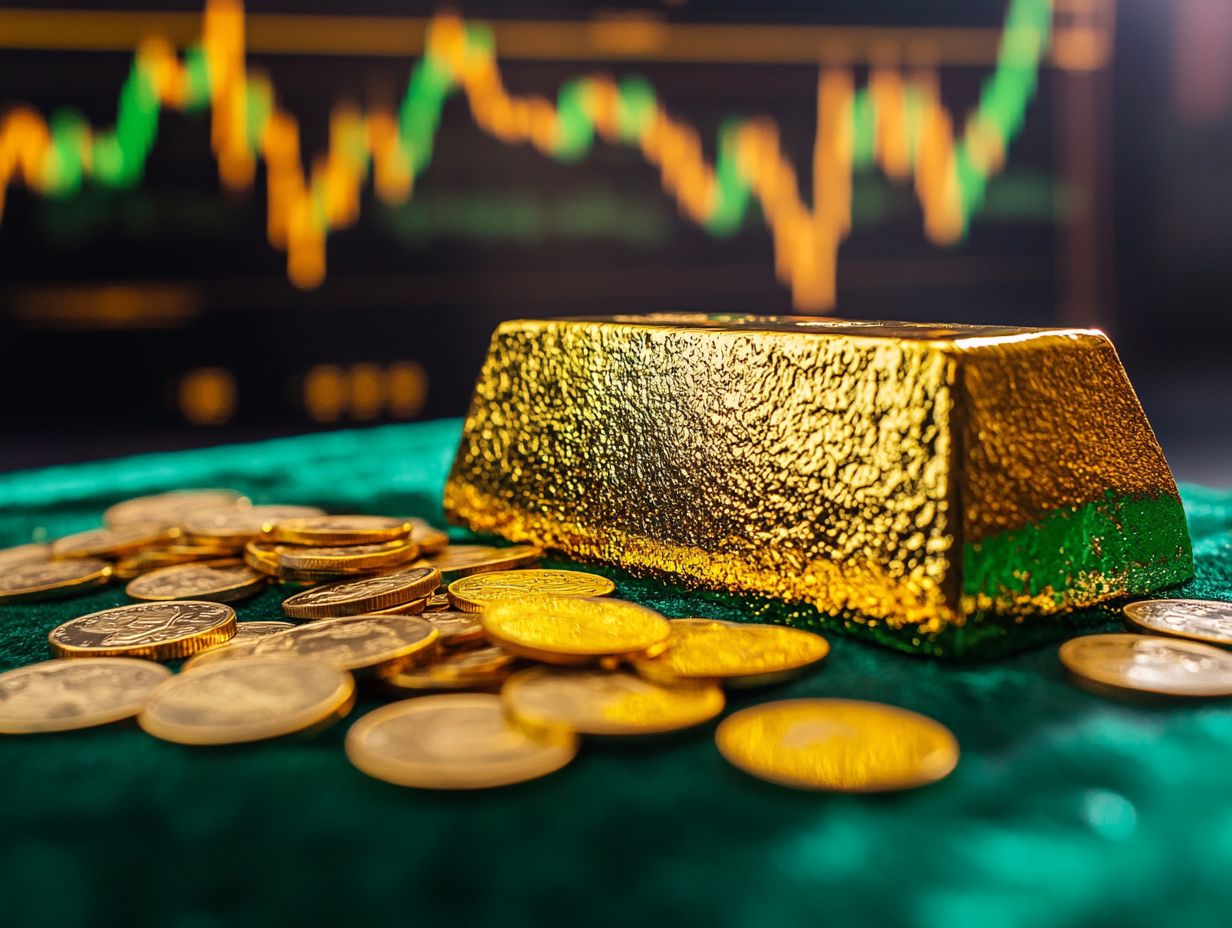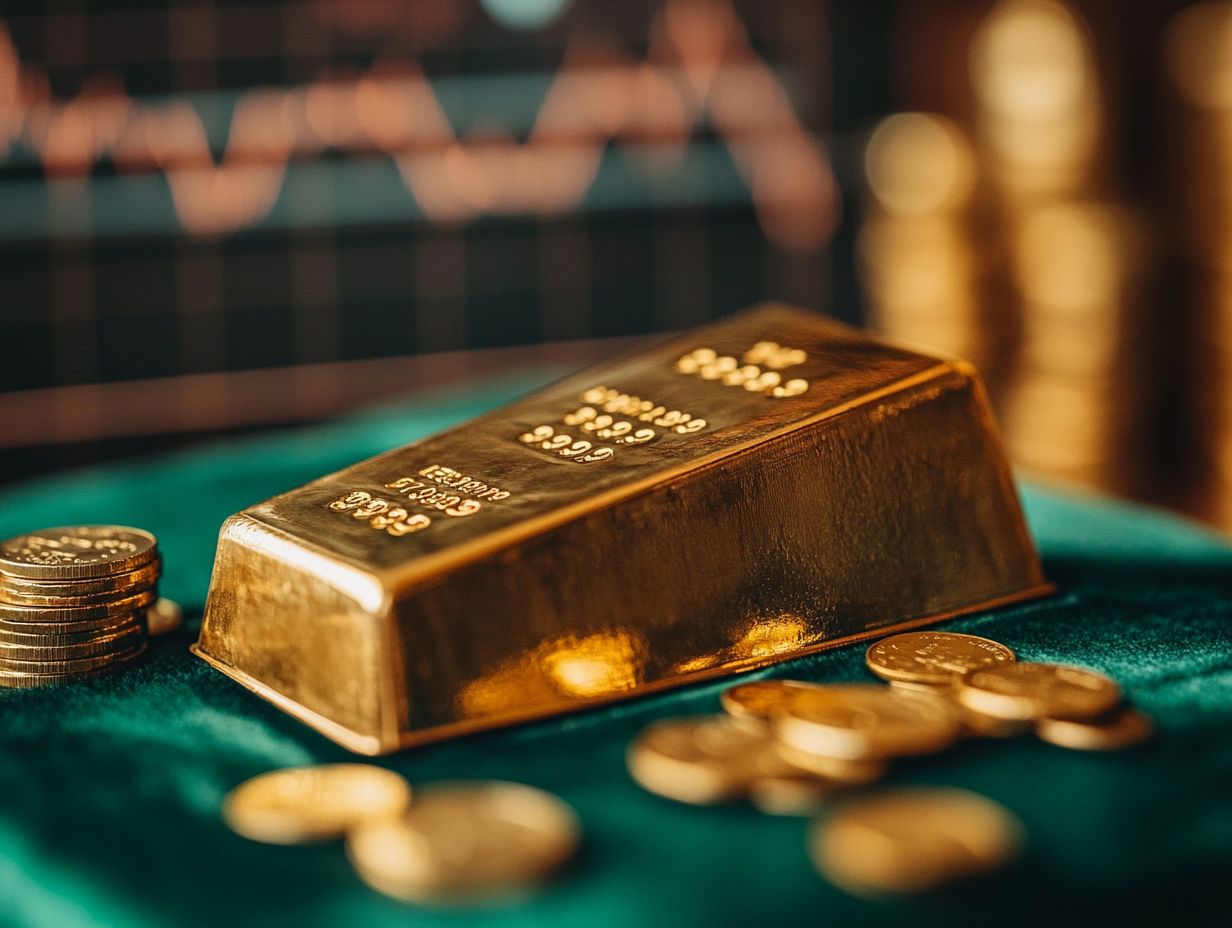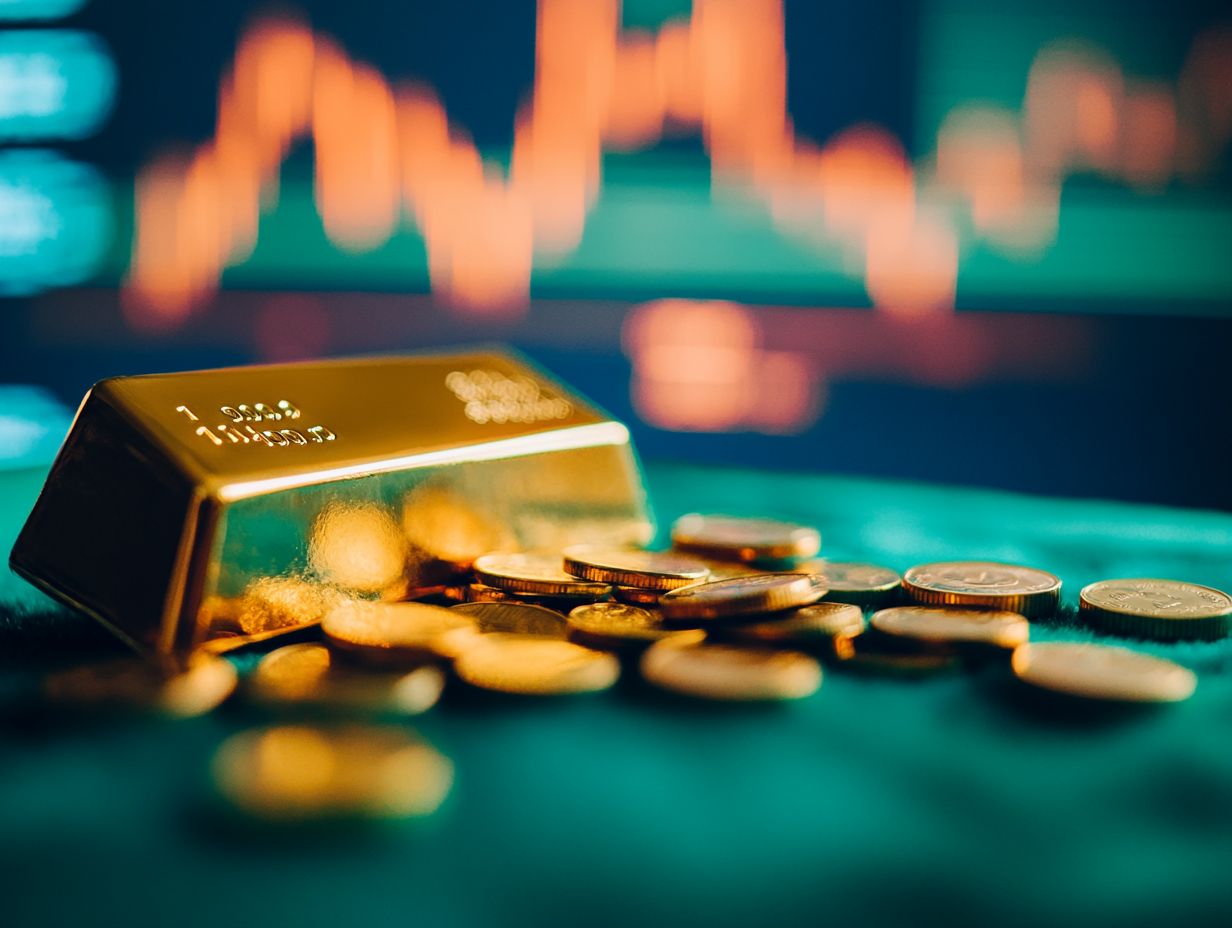The Psychology of Gold Investments
Gold is a must-have for every savvy investor seeking security and wealth! It has long captivated investors, enchanting them with its luster and profound significance across cultures and economies.
As a timeless symbol of wealth and security, gold s allure goes beyond simple financial gain. This article delves into the psychology behind gold investments, uncovering historical influences, emotional responses to fear and uncertainty, and the enticing prospect of high returns.
You ll also discover strategies to navigate emotional pitfalls, empowering you to make informed and rational investment choices in a world frequently shrouded in anxiety.
Contents
- Key Takeaways:
- Understanding the Appeal of Gold Investments
- The Role of Fear and Uncertainty in Gold Investments
- The Psychology of Risk and Return in Gold Investments
- Strategies for Managing Emotions in Gold Investments
- Frequently Asked Questions
- What drives people to invest in gold?
- Why do some people have a strong emotional attachment to gold?
- How does the fear of missing out (FOMO) impact gold investments?
- Is there a psychological impact when gold prices fluctuate?
- How does the availability of information affect gold investments?
- Can psychological biases affect gold investments?
Key Takeaways:

- Gold investments are influenced by history and psychology.
- Economic and political factors drive demand for gold.
- High returns attract investors, but it’s important to manage emotions.
Understanding the Appeal of Gold Investments
Gold has enchanted humanity since the days of ancient civilizations, from the Egyptians to the Incas. It symbolizes wealth and power while playing a pivotal economic role throughout history.
Its appeal as a type of investment arises from a blend of factors, including market volatility (the fluctuations in investment prices), the intricacies of human psychology, and its longstanding status as a medium of exchange. Additionally, exploring the benefits of long-term gold investments can provide valuable insights into this timeless asset.
In today s landscape, gold is viewed not merely as a form of jewelry, but as a robust store of value and a reliable shield against inflation. This duality makes it a prominent choice in any discerning investor’s financial portfolio.
Historical Significance and Cultural Associations
Gold has been cherished by cultures throughout history, captivating everyone from the ancient Egyptians, who adorned their pharaohs with exquisite gold jewelry, to the Incas, who viewed it as the ‘sweat of the sun.’ This illustrates its profound historical significance and rich cultural associations across civilizations.
In various societies, gold transcends mere beauty; it plays a crucial role in rituals, serving as a symbol of divine connection, purity, and power. Its role as currency stretches back thousands of years, helping trade and keeping economies stable in great civilizations like Mesopotamia and Rome.
This intrinsic value grants gold a distinctive status that resonates even today, as modern economies still regard it as a safe haven during uncertain times. The allure of gold continues to weave through personal aspirations, investment portfolios, and cultural celebrations, solidifying its timeless legacy.
Psychological Factors that Drive Demand
The demand for gold is profoundly shaped by psychological factors, including humanity’s inherent attraction to scarcity and the perception of intrinsic value. This makes gold a unique commodity that many individuals consider essential for their financial security.
During times of economic instability, this allure intensifies. Investors, driven by the fear of market fluctuations and downturns, instinctively turn to gold. As uncertainties loom, there’s a natural inclination to seek out the history of gold as an investment due to its historical reputation as a safe haven asset.
In turbulent times, the psychological need for predictability leads to a collective behavior where purchasing gold becomes a means of safeguarding wealth. These inclinations significantly influence investor behavior, steering decision-making processes towards preservation rather than growth. Ultimately, this underscores how deeply intertwined human emotions are with financial choices in the marketplace, highlighting the cultural significance of gold investments.
The Role of Fear and Uncertainty in Gold Investments

In moments of market volatility and political uncertainty, gold stands out as a sanctuary for investors. Its status as a financial investment is firmly established, revered for its reliability as a store of value.
This allure particularly resonates with those who embrace a ‘safety net’ mentality in turbulent times, seeking stability amid chaos.
How Economic and Political Factors Influence Demand
Economic factors such as inflation and political instability significantly impact your demand for gold. During times of market fluctuations and uncertainty, you might seek refuge in this precious metal.
When interest rates are low, the opportunity cost of holding non-yielding assets like gold the potential earnings lost from not investing in assets that pay interest diminishes. This makes gold increasingly attractive to you as an investor.
If currency devaluation threatens your purchasing power, you may seek gold as a safeguard against such risks. Global events, whether they involve geopolitical tensions or economic crises, create further volatility and might make you rethink your investments.
As these elements interact, your strategies might fluctuate. Some days, you may want to increase your gold holdings; on others, you might look to diversify even further.
This dynamic landscape constantly reshapes how you approach the gold market. It is essential to stay informed and adaptable.
The ‘Safety Net’ Mentality
The ‘safety net’ mentality often compels you to seek the perceived security of gold, especially during times of economic turmoil. You may view it as a reliable hedge against financial instability.
This psychological inclination stems from the fear of losing your hard-earned wealth amid fluctuating markets or geopolitical tensions. For instance, during the 2008 financial crisis, many individuals like you flocked to gold as stock values plummeted, securing their assets in a timeless commodity that has weathered countless storms. Understanding the evolution of gold investment trends can provide valuable insights into why many consider it a safe haven.
Similarly, back in 1940, as World War II loomed, gold prices soared as investors recognized its enduring value in uncertain circumstances. This historical example highlights not only a protective instinct but also a compelling narrative that urges you to turn to gold as a beacon of hope when other investments seem perilous. However, it’s important to consider the risks of gold investments before making any decisions.
The Psychology of Risk and Return in Gold Investments
Understanding the psychology of risk and return is essential for you as an investor in the gold market. Your perceptions of risk play a pivotal role in shaping your investment decisions and significantly influence the allure of the high returns associated with this precious metal.
Risk Perception and the Allure of High Returns

Risk perception plays a crucial role in shaping the irresistible allure of high returns in gold investments. As you weigh the potential volatility of markets against gold s historical performance as a reliable investment, the stakes become clear.
Throughout history, gold has solidified its reputation as a safe haven, particularly during times of economic uncertainty. For example, during the 2008 financial crisis, gold prices soared as investors sought refuge in its stability, while equities and real estate values plunged dramatically.
When you compare gold to other commodities like oil or agricultural products, you ll notice that those can be significantly affected by geopolitical tensions and climate fluctuations. Gold, on the other hand, tends to showcase more consistent resilience, making it a uniquely appealing option within a diversified portfolio.
Understanding how your perception of risk influences these dynamics empowers you to make informed investment decisions. Shifts in economic sentiment can lead to notable movements in gold prices, and being proactive can position you favorably in the marketplace.
Now is a crucial time to understand these dynamics and consider how they can impact your investments.
Psychological Biases and Decision Making in Gold Investments
Psychological biases like loss aversion and overconfidence can significantly impact your decisions as a gold investor. These biases often lead to poor investment choices.
These mental traps can make you ignore important market signals, limiting your potential returns. For instance, loss aversion might cause you to cling to losing investments for too long, while overconfidence could result in excessive trading. Understanding the significance of gold and silver in culture can also provide valuable insights into market trends.
The study of how emotions affect financial decisions provides valuable insights into these patterns, helping you understand the emotional and psychological factors at play. Recognizing and addressing these biases can help you make better decisions in the gold market.
Understanding how these biases manifest can refine your investment strategies and enhance your outcomes.
Strategies for Managing Emotions in Gold Investments
Managing your emotions is crucial for successful gold investments. Emotional decision-making can lead to irrational behaviors that jeopardize your financial returns.
Stay calm and focused to boost your chances of success! By maintaining control over your feelings, you can make more informed and strategic choices that will enhance your long-term success in the market.
Practical Tips for Avoiding Emotional Investment Decisions
To steer clear of emotionally charged decisions when investing in gold, adopt some practical strategies. Start by establishing predefined entry and exit points and regularly reviewing your investment strategy.
It s essential to maintain discipline by setting clear financial goals and sticking to your risk tolerance levels. By relying on data-driven insights instead of falling prey to market hype or fear, you can enhance your decision-making process.
Incorporating regular self-assessments helps identify emotional triggers that may lead to impulsive choices. Fostering a routine of continuous learning about market trends empowers you to make informed decisions, supporting a more rational approach to your investment strategy, especially considering the impact of inflation on precious metals.
Frequently Asked Questions

What drives people to invest in gold?
The psychology behind gold investments is largely driven by the perception of gold as a safe haven and a store of value. In times of economic uncertainty, people tend to gravitate towards gold to protect their wealth from market fluctuations.
Why do some people have a strong emotional attachment to gold?
The allure of gold is often tied to its historical and cultural significance. Throughout history, gold has symbolized wealth, power, and success, creating a strong emotional attachment to owning it.
How does the fear of missing out (FOMO) impact gold investments?
The fear of missing out can significantly drive people to invest in gold. When gold prices rise, individuals may feel pressured to buy before it becomes too expensive, leading to impulsive and emotionally-driven decisions.
Is there a psychological impact when gold prices fluctuate?
Yes, the volatility of gold prices can psychologically affect investors. A sudden price drop can cause fear and uncertainty, while a steady price increase can create a sense of security, leading to irrational decision-making.
How does the availability of information affect gold investments?
The availability of information and news about gold greatly influences investor behavior. Positive news can inspire optimism and drive prices up, while negative news can incite panic and drive prices down, fostering herd mentality and the “bandwagon effect”.
Can psychological biases affect gold investments?
Absolutely. Psychological biases like confirmation bias, overconfidence, and herding behavior can hinder well-informed choices about gold investments, leading to irrational decision-making.















